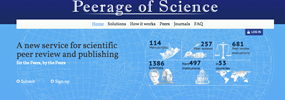What does the future of peer review looks like? Since the main platform of scholarly publishing has changed from printed to on line, researchers have been challenged to adapt to a faster, more demanding and interactive way to assess the quality and originality of papers submitted to publication. Janet Seggie, Editor-in-Chief of Health and Medical Publishing Group and Editor of the South African Medical Journal, will address the trends in peer review worldwide and in South Africa, which SciELO national collection has recently achieved certification.
Janet Seggie, graduated Bachelor of Science, MD, Fellow of the Royal College of Physicians (London), qualified MBChB (Birm) in 1972 and Specialized in Internal Medicine and Nephrology. Consultant Physician and Professor of Medicine, and Assistant Dean: Undergraduate Education, at Groote Schuur Hospital/Faculty of Health Sciences: University of Cape Town, until retirement in 2012. Served as a Member of the Editorial Board of the Journal of Continuing Medical Education (CME) and, as requested, as reviewer for Medical Education and Medical Teacher and the South African Medical Journal.
Upon retiring from clinical practice, assumed the role of Editor-in-Chief of Health and Medical Publishing Group and Editor of the South African Medical Journal.
1. The peer review process is a specialized and valuable work that is discarded after a paper is accepted for publication. There have been recently published studies showing that all actors in the publishing process would benefit from an open peer review, i.e. publishing reviewers comments along with the paper. What is your opinion about that?
Certainly authors seem to prefer open peer review but one has to question whether this might be sustainable in a small country such as South Africa where the SA journals rely perforce principally on a relatively small population of academics affiliated to a small number of academic institutions (viz. 8 medical schools in the case of the SAMJ). My view is that while some colleagues might have no objection, others would prefer to remain anonymous regarding publishing reviewers comments along with the paper.
This is not to say that one does not support the “open” process. The BMJ has provided the evidence that this is sustainable, indeed, preferable and have the undertaken the research to confirm that the quality of review does not suffer and may in fact be enhanced.
Post-publication review – which is what, I think, is intimated, within this question – would, in the words of Richard Horton, facilitate “make continuous but constructive criticism of research a new norm of science” (Horton 2011).
2. Some authors advocate that peer review might prevent – or delay – the publication of relevant work. Do you believe that post-published review or “trial by twitter” may actually work?
The problem with the realm of peer review is that it is poorly researched.
What post-publication peer review does promise is the establishment of a virtual journal club encouraging colleagues within a specific field of science to converse with one another and permit the constructive criticism (to which Horton alludes – see above) to take place.
Journallab.com appears to offer something of the kind and would mitigate the flaws in pre-publication peer review by:

- asking for raw data
- repeating analyses
- checking all the references, and
- making detailed suggestions for improvement
- detecting errors or fraud
Graduate students and post-doctoral researchers, and their seniors, would contribute by sharing their insights about published data in the same way that this is a regular component of real time lab meetings and journal clubs.
Participating in Journal Lab makes your workflow easier.
̶ You can see others’ reactions experiences with a new paper’s methods, ask questions of the author, and leave insights that you feel are not yet represented. Summarizing papers and leaving comments is a great way to build name recognition in your field.
Peerage of Science offers something similar.

3. Since there are no specific training activities to exert peer reviewing, it has been suggested that introducing specific errors in papers to be detected by young reviewers in a mentored guided training may contribute to form a new generation of peer reviewers. Do you concur?
I concur fully with formal training in peer review for young scientists. Indeed, these colleagues, active within their research fields, are the ideal reviewers! And, yes, introducing errors into papers that are the subject matter of such formal training, thus to educate the future reviewers would seem sensible; especially as there is research that shows that reviewers are bad at picking up such errors (viz. the BMJ research that exercised reviewers on papers that deliberately contained errors BUT showed that nobody spotted all of the errors; some reviewers failed to spot any; most reviewers spotted only about a quarter of the errors).
4. Which would be, is your opinion, the best way to acknowledge good quality peer review and prevent biased or superficial review? Do you consider remunerating peer review?
I do not believe that remuneration would confirm quality. (And, it bears noting that journals such as those I oversee, could not afford to remunerate their reviewers. However, some reward is necessary for the “missionary” work that is asked of reviewers, who must carve 4-6 hours out of their busy professional and personal lives to turn in a quality review. What is required is that reviewing be recognized as an integral part of the research endeavor, paralleling the publication of research, on the part of employing institutions. And that reviewing for Journal X and Journal Y count towards promotion, just as publishing in Journal X does.
5. During the 2013 Peer Review Congress in Chicago, it has been discussed the validity of certain drug trials, since a number of studies are not methodologically appropriate and/or statistically significant, although many have been published in high impact – and allegedly strictly reviewed – journals. What, in your opinion, can be done to prevent such studies to be published?
(I look forward to learning more about this congress from colleagues at the SciELO meeting).
This question is a hard one and raises issues of ethics such as conflicts of interest on the part of reviewers of such drug trials and “ghost” writing. The risk is that reviewers of drug A might be involved with trials of Drug B (aimed at the same disease/condition and having similar efficacy). Clearly reviewers must be required to declare their conflicts of interest, should such exist. I would add that advertising on the part of Pharma might also distort the publication process, raising questions of perverse incentives, especially in the current economic climate faced by publishing in general, and academic publishing in particular.
As to methodology and statistical significance, here journals must rely on reviews from statisticians to determine the robustness of the study protocol and the conclusions drawn from the results. But, this requires that journals employ statisticians… something only the wealthiest journals might manage.
Reference
HORTON, R. Written evidence to UK Parliament. Parliament UK, 9 Feb 2011. Available from: <http://www.publications.parliament.uk/pa/cm201011/cmselect/cmsctech/writev/856/m02.htm>
Como citar este post [ISO 690/2010]:














Recent Comments